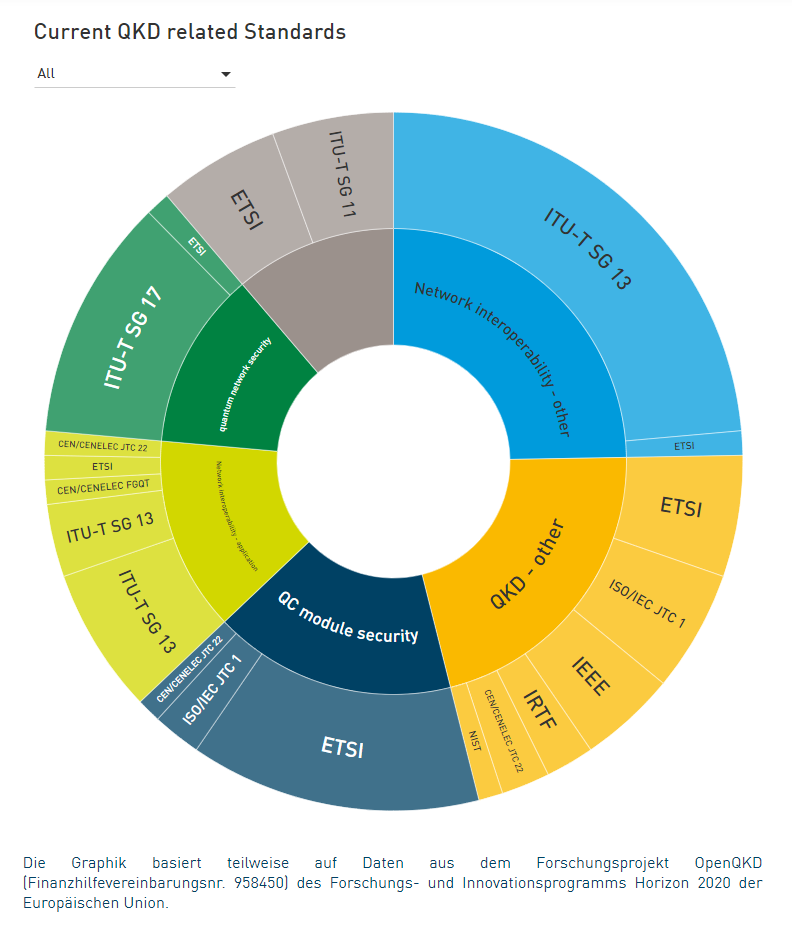Standardization
Deutsches Institut für Normung (DIN)
Norms and Standards for Quantum Communication
Early standardization enables sustainable technological leaps and forms the basis for certification. For this reason, the Deutsche Institut für Normung (DIN) was commissioned to analyze together with the experts from the Quantum Communication Community current standardization needs and to coordinate and sharpen standardization activities in the further course of the project.
Author of the illustration: © Deutsches Institut für Normung (DIN)
European Standardization
European Commission:
Making Quantum Technologies
Ready for Industry
The Joint Research Center (JRC) in cooperation with the European Committee for Standardization (CEN) and the European Committee for Electrotechnical Standardization (CENELEC), European Commission’s Directorate General Communications Networks, Content and Technology (DG CNECT), and the Deutsche Institut für Normung (DIN), organized the Putting-Science-Into-Standards (PSIS) workshop on Quantum Technologies in Brussels on 28 to 29 March 2019. The concrete action points for standardization were summarized in the JTC report “Making Quantum Technology Ready for Industry”.
European Standardization
CEN-CENELEC
Quantum Technologies
The CEN and CENELEC Joint Technical Committee 22 (CEN/CLC/JTC 22) is developing standards relevant to Quantum Technologies. European experts are invited to contact their National Standards Body (NSB) or National Committee (NC), and contribute to this standards development.
European Standardization
OpenQKD
Within the framework of the “OpenQKD” project of the EU Framework Program “Horizon 2020”, a multidisciplinary team from 13 EU countries has investigated the potential of Quantum Communication for the digital security of the EU infrastructure. The results of the gap analysis of the QKD standardization landscape were published in the study “Current Standardisation Landscape and existing Gaps in the Area of Quantum Key Distribution”.
European Standardization
ETSI
Quantum Key Distribution
Industry Specification Group (ISG) on Quantum Key Distribution(QKD) has recently published the first Protection Profile for QKD systems and has been working on various specifications.
International Standardization
ISO/IEC DIS 23837:
Security requirements, test and evaluation methods for QKD
ISO/IEC 23837 defines a set of rigorous and common security specifications for QKD modules manufacturers, so that manufacturers can follow the standard to design and implement IT products that use QKD, and evaluators can follow the standard to test and evaluate the security of QKD modules, reducing the risk of a failure of security in operation. This document uses the standardized model and language of ISO/IEC 15408 to define a common baseline set of security functional requirements for QKD modules.
International Standardization
ITU‑T
ITU‑T Study Group 17 (SG17) coordinates security-related work across all ITU‑T Study Groups, often working in cooperation with other standards development organizations (SDOs) and various ICT industry consortia. Quantum-safe security is a subject of fast-growing importance to SG17’s work, with relevant standards providing considerations relevant to the design, implementation and operation of key management for Quantum Key Distribution networks (Recommendation ITU‑T X.1702, X.1710, X.1712, X.1714, X.1715, Y.3800‑Y.3814).


![BMBF_CMYK_Gef_M [Konvertiert] BMBF_CMYK_Gef_M [Konvertiert]](https://www.squad-germany.de/ycickowu/elementor/thumbs/BMBF_gefoerdert_2017_en-qiq7ymwpjqrvffqhi8hnregfu44s81i39ktahjs6l6.jpg)